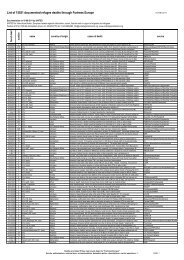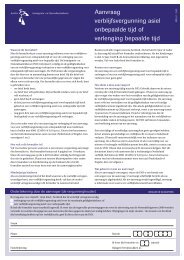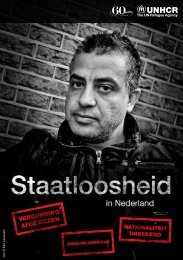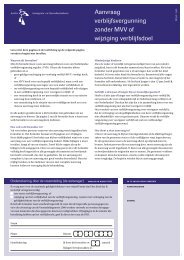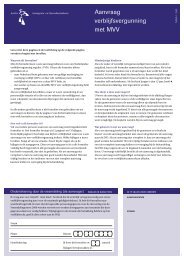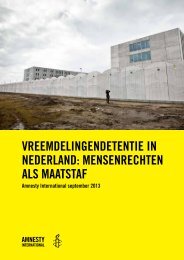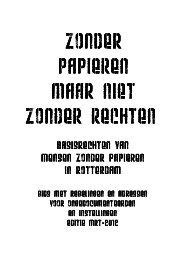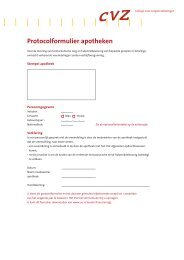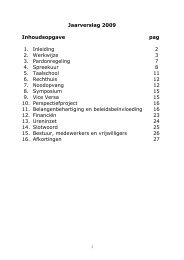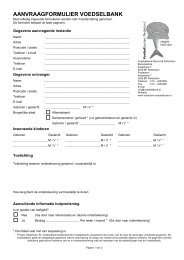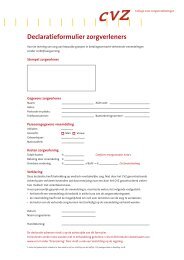Handboek voor begeleiders van vluchtelingen en ... - Stichting ROS
Handboek voor begeleiders van vluchtelingen en ... - Stichting ROS
Handboek voor begeleiders van vluchtelingen en ... - Stichting ROS
You also want an ePaper? Increase the reach of your titles
YUMPU automatically turns print PDFs into web optimized ePapers that Google loves.
Conclusion.<br />
The increasing use of det<strong>en</strong>tion as a restriction on the freedom of movem<strong>en</strong>t of asylum<br />
seekers on the grounds of their illegal <strong>en</strong>try is a matter of major concern to UNHCR, NGOs,<br />
other ag<strong>en</strong>cies as well as Governm<strong>en</strong>ts. The issue is not a straight-forward one and these<br />
guidelines have addressed the legal standards and norms applicable to the use of det<strong>en</strong>tion.<br />
Det<strong>en</strong>tion as a mechanism which seeks to address the particular concerns of States related to<br />
illegal <strong>en</strong>try requires the exercise of great caution in its use to <strong>en</strong>sure that it does not serve to<br />
undermine the fundam<strong>en</strong>tal principles upon which the regime of international protection is<br />
based.<br />
1. These Guidelines address exclusively the det<strong>en</strong>tion of asylum seekers. The det<strong>en</strong>tion of refugees is<br />
g<strong>en</strong>erally covered by national law and subject to the principles, norms and standards contained in the<br />
1951 Conv<strong>en</strong>tion, and the applicable human rights instrum<strong>en</strong>ts.<br />
2. The G<strong>en</strong>eva Conv<strong>en</strong>tion of 28 July 1951 Relating to the Status of Refugees.<br />
3. Views of the Human Rights Committee on Communication No. 560/1993, 59th Session,<br />
CCPR/C/D/560/1993.<br />
4. UNHCR has be<strong>en</strong> requested to provide technical and advisory services to states on nationality<br />
legislation or practice resulting in statelessness. EXCOM Conclusion No. 78(XLVI) (1995), G<strong>en</strong>eral<br />
Assembly Resolution 50/152,1996. See also Guidelines: Field Office Activities Concerning<br />
Statelessness.(IOM/66/98-FOM70/98).<br />
5. Article 9(1) International Cov<strong>en</strong>ant on Civil and Political Rights.(ICCPR)<br />
Article 37(b) UN Conv<strong>en</strong>tion on the Rights of the Child.(CRC)<br />
Article 5(1) European Conv<strong>en</strong>tion for the Protection of Human Rights and Fundam<strong>en</strong>tal<br />
freedoms.(ECHR)<br />
Article 7(2) American Conv<strong>en</strong>tion on Human Rights 1969.(American Conv<strong>en</strong>tion)<br />
Article 5 African Charter on Human and People’s Rights. (African Charter)<br />
6. Article 9(1), Article 12 ICCPR,<br />
Article 37(b) CRC<br />
Article 5(1)(f) ECHR<br />
Article 7(3) American Conv<strong>en</strong>tion<br />
Article 6 African Charter<br />
EXCON Conclusion No. 44(XXXVII)<br />
7. EXCON Conclusion No<br />
8. Sub committee of the Whole of International Protection Note EC/SCP/44 Paragraph 51©<br />
9. Art 16, Art 12 UDHR<br />
10. Article 9(2) and (4) ICCPR<br />
Article 37(d) CRC<br />
Article 5(2) and (4) ECHR<br />
Article 7(1) African Charter.<br />
Article 7(4) and (5) American Conv<strong>en</strong>tion<br />
EXCOM Conclusion no. 44 (XXXVII) UN Body of Principles for the Protection of All Persons under any<br />
Form of Det<strong>en</strong>tion or Imprisonm<strong>en</strong>t. 1988<br />
UN Standard Minimum Rules for the Treatm<strong>en</strong>t of Prisoners 1955<br />
11.See also UN Rules for the Protection of Juv<strong>en</strong>iles Deprived of their Liberty 1990<br />
12. An adult who is familiar with the child’s language and culture may also alleviate the stress and<br />
trauma of being alone in unfamiliar surroundings.<br />
13. Although it must be recognised that most individuals will be able to articulate their claims, this may<br />
not be the case in those who are victims of trauma. Care must be tak<strong>en</strong> wh<strong>en</strong> dealing with these<br />
individuals as their particular problems may not be appar<strong>en</strong>t, and it will require care and skill to assess<br />
the situation of a person with m<strong>en</strong>tal disability or a disori<strong>en</strong>ted older refugee who is alone.<br />
14. See UNHCR Guidelines on The Protection of Refugee Wom<strong>en</strong>.<br />
15.Wom<strong>en</strong> particularly those who have traveled alone may have be<strong>en</strong> exposed to viol<strong>en</strong>ce and<br />
exploitation prior to and during their flight and will require counseling.<br />
16. Art 15 UDHR. See EXCOM No. 78(XLVI) Article 6 African Charter. EXCOM Conclusion No.<br />
44(XXXVII) 7. EXCOM Conclusion No. 44 (XXXVII) 8. Sub Committee of the Whole of International<br />
Protection Note EC/SCP/44 Paragraph 51(c)<br />
80




